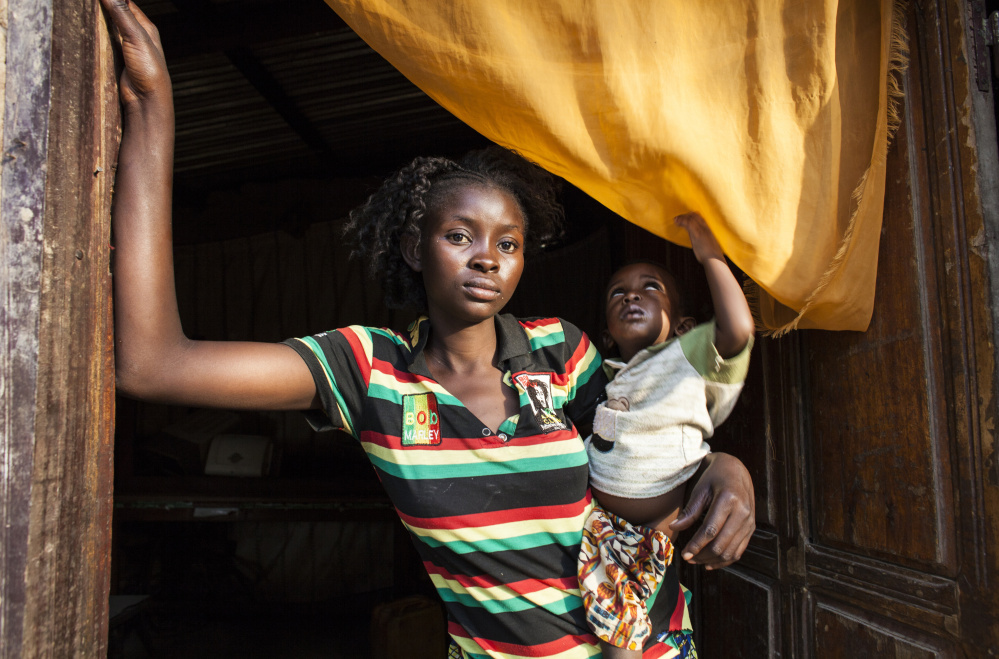BANGUI, Central African Republic — The neighborhood is a patchwork of low-slung buildings scorched and looted at the height of the civil war, a place where the United Nations was supposed to come to the rescue. But in a number of homes, women and girls are raising babies they say are the children of U.N. troops who abused or exploited them.
“Peacekeeper babies,” the United Nations calls such infants.
“A horrible thing,” says an elfin 14-year-old girl, who describes how a Burundian soldier dragged her into his barracks and raped her, leaving her pregnant with the baby boy she now cradles uncomfortably.
The allegations come amid one of the biggest scandals to plague the United Nations in years. Since the U.N. peacekeeping mission here began in 2014, its employees have been formally accused of sexually abusing or exploiting 42 local civilians, most of them underage girls.
U.N. Secretary General Ban Ki-moon has called sexual abuse by peacekeepers “a cancer in our system.” In August, the top U.N. official here was fired for failing to take enough action on abuse cases. Nearly 1,000 troops whose units have been tied to abuses have been expelled, or will be soon. Among them is the entire contingent from the Democratic Republic of the Congo.
SEX FOR FOOD OR MONEY
But the victims appear to be more numerous than the United Nations has acknowledged so far. In a corner of the capital city known as Castors, near the U.N. headquarters in the country, The Washington Post interviewed seven women and girls who described contact with peacekeepers that violated U.N. regulations against sexual exploitation and abuse. Five of them said they exchanged sex for food or money – sometimes as little as $4 – while their country was rocked by civil war and families were going hungry. Two had reported their cases to the United Nations.
Five of the seven interviewed by The Post said they had borne the children of their abusers. The 14-year-old mother said she was raped, but the United Nations recorded her case as involving “transactional” sex, in which acts are exchanged for money or food.
“Sometimes when I’m alone with my baby, I think about killing him,” the teen said, holding the little boy. “He reminds me of the man who raped me.”
The Washington Post does not usually identify minors who are victims of sexual abuse or exploitation.
The accounts by the women and girls could not be independently verified. But their stories echoed other accounts of abuse in the Central African Republic collected by independent groups and the United Nations.
The U.N. system responsible for handling and prosecuting such cases has been widely criticized as dysfunctional, even after scandals involving peacekeepers in other parts of the world. Only one criminal charge has been filed in relation to any of the 42 cases of sexual abuse or exploitation that have been officially registered in the Central African Republic, according to U.N. officials.
U.N. officials did file a report on the 14-year-old mother’s allegations, and a U.N. spokeswoman, Ismini Palla, said the organization was “monitoring the case of the girl closely.” But nine months after the girl reported the alleged rape, investigators have not reported any results.
EXTREME BRUTALITY
The sexual abuse scandal is the latest horrific development in a war already marked by extreme brutality. The conflict began in late 2013 when mostly Muslim rebels overthrew the government in this Christian-majority country, setting off a cycle of revenge killings that in Bangui fell largely along religious lines. About 6,000 people have been killed. The U.N. mission, which includes troops from 46 countries and is known as MINUSCA, was established to provide security and protect civilians.
Numerous allegations have emerged in recent months of peacekeeper abuse of vulnerable residents. Human Rights Watch issued a report this month documenting the cases of eight women and girls allegedly raped or sexually exploited by U.N. peacekeepers in late 2015 in the central city of Bambari. Amnesty International said last August that it had obtained evidence of a U.N. peacekeeper’s rape of a 12-year-old girl in the capital.
U.N. officials recognize that they are grappling with a serious breakdown in their peacekeeping forces. This month, they said they were investigating the cases of four girls who were allegedly exploited or abused at a camp for internally displaced persons in central Ouaka prefecture. In January, they said that at least four peacekeepers had allegedly paid girls as little as 50 cents for sex at a camp in Bangui.
“We’re going to be flooded by paternity claims,” Parfait Onanga-Anyanga, the newly appointed head of the U.N. mission, said in an interview.
Send questions/comments to the editors.



Success. Please wait for the page to reload. If the page does not reload within 5 seconds, please refresh the page.
Enter your email and password to access comments.
Hi, to comment on stories you must . This profile is in addition to your subscription and website login.
Already have a commenting profile? .
Invalid username/password.
Please check your email to confirm and complete your registration.
Only subscribers are eligible to post comments. Please subscribe or login first for digital access. Here’s why.
Use the form below to reset your password. When you've submitted your account email, we will send an email with a reset code.